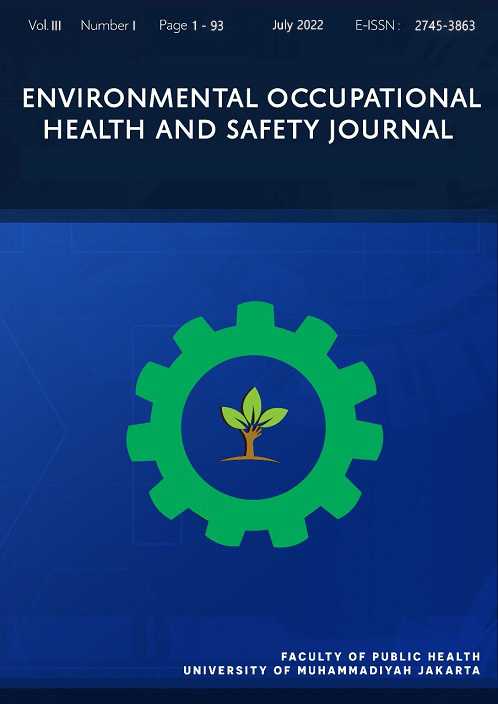Analisis Pengetahuan, Pendidikan Dan Sikap Terhadap Manajemen Popok Sekali Pakai
Main Article Content
Abstract
Article Details
References
WHO, UNICEF. Progress on household drinking water, sanitation and hygiene 2000-2020: five years into the SDGs (Geneva) [Internet]. Joint Water Supply, & Sanitation Monitoring Programme. 2021. 1–164 p. Available from: http://apps.who.int/bookorders.
Ayalew AM, Mekonnen WT, Abaya SW, Mekonnen ZA. Assessment of diarrhea and its associated factors in under-five children among open defecation and open defecation-free rural settings of Dangla District, Northwest Ethiopia. J Environ Public Health. 2018;2018.
Anandan M, VS S, Rubeshkumar P, Ponnaiah M, Jesudoss P, Karumanagounder K, et al. Outbreak of acute diarrhoeal disease attributed to consumption of faecal contaminated water supplied through damaged pipelines in Thiruper, Tiruvallur district, Tamil Nadu, India, 2016. Clin Epidemiol Glob Heal [Internet]. 2021;10(October 2020):100701. Available from: https://doi.org/10.1016/j.cegh.2021.100701
Bekele D, Merdassa E, Desalegn M, Mosisa G, Turi E. Determinants of diarrhea in under-five children among health extension model and non-model families in wama hagelo district, west ethiopia: Community-based comparative cross-sectional study. J Multidiscip Healthc. 2021;14:2803–15.
Rahmat ZS, Zubair A, Abdi I, Humayun N, Arshad F, Essar MY. The rise of diarrheal illnesses in the children of Pakistan amidst COVID-19: A narrative review. Heal Sci Reports. 2023;6(1):1–8.
Abbafati C, Abbas KM, Abbasi-Kangevari M, Abd-Allah F, Abdelalim A, Abdollahi M, et al. Global burden of 369 diseases and injuries in 204 countries and territories, 1990–2019: a systematic analysis for the Global Burden of Disease Study 2019. Lancet. 2020;396(10258):1204–22.
Behera DK, Mishra S. The burden of diarrhea, etiologies, and risk factors in India from 1990 to 2019: evidence from the global burden of disease study. BMC Public Health [Internet]. 2022;22(1):1–9. Available from: https://doi.org/10.1186/s12889-022-12515-3
Brinckmann, M. Baby Diapers Report 2022: Statista Consumer Market Outlook - Segment Report. 2022.
Mendoza JMF, D’Aponte F, Gualtieri D, Azapagic A. Disposable baby diapers: Life cycle costs, eco-efficiency and circular economy. J Clean Prod [Internet]. 2018;211:455–67. Available from: https://doi.org/10.1016/j.jclepro.2018.11.146
Itsubo N, Wada M, Imai S, Myoga A, Makino N. Life Cycle Assessment of the Closed-Loop Recycling of Used Disposable Diapers. Resources. 2020;9(34):1–15.
Bappenas. Pilar Pembangunan Lingkungan. 2020. 106 p.
Delelegn D, Tolcha A, Beyene H, Tsegaye B. Status of active trachoma infection among school children who live in villages of open field defecation: a comparative cross-sectional study. BMC Public Health. 2021;21(1):1–10.
Rahman MHU, Malik MA, Chauhan S, Patel R, Singh A, Mittal A. Examining the linkage between open defecation and child malnutrition in India. Child Youth Serv Rev [Internet]. 2020;117(August):105345. Available from: https://doi.org/10.1016/j.childyouth.2020.105345
Diniah BN. Hubungan Antara Tingkat Pengetahuan Dan Kebijakan Pengelolaan Sampah Popok Sekali Pakai Dengan Jumlah Timbulan Sampah Yang Dihasilkan Pada Anak Di Bawah 3 Tahun (Batita). J Public Heal Innov. 2020;1(1):60–71.
Wulandari D, Suwanda IM. Peran Yayasan Ecoton Dalam Menumbuhkan Kesadaran Ecological Citizenship Pada Masyarakat Daerah Aliran Sungai Brantas (STUDI KASUS KECAMATAN WRINGINANOM KABUPATEN GRESIK). Kaji Moral dan Kewarganegaraan. 2019;7(2):1008–22.
Shuker IG, Cadman CA. Indonesia - Marine Debris Hotspot : Rapid Assessment Synthesis Report (English) [Internet]. World Bank Group. Washington, D.C.; 2018. Available from: http://documents.worldbank.org/curated/en/983771527663689822/Indonesia-Marine-debris-hotspot-rapid-assessment-synthesis-report
Roman L, Hardesty BD, Leonard GH, Pragnell-Raasch H, Mallos N, Campbell I, et al. A global assessment of the relationship between anthropogenic debris on land and the seafloor. Environ Pollut [Internet]. 2020;264:114663. Available from: https://doi.org/10.1016/j.envpol.2020.114663
Płotka-Wasylka J, Makos-Chełstowska P, Kurowska-Susdorf A, Trevino MJS, Guzman SZ, Mostafa H, et al. End-of-life management of single-use baby diapers: Analysis of technical, health and environment aspects. Sci Total Environ. 2022;836(March).
Doron A. Stench and sensibilities: On living with waste, animals and microbes in India. Aust J Anthropol. 2020;32(S1):23–41.
Bill F, Foundation MG. Articles Estimates of the global, regional, and national morbidity, mortality, and aetiologies of diarrhoea in 195 countries : a systematic analysis for the Global Burden of Disease Study 2016. Lancet. 2018;19:1–18.
Thongsamer T, Neamchan R, Blackburn A, Acharya K, Sutheeworapong S, Tirachulee B, et al. Environmental antimicrobial resistance is associated with faecal pollution in Central Thailand’s coastal aquaculture region. J Hazard Mater. 2021;416(March).
Mathe M. Environmental Pollution-Perceptions and Views on usage and Disposal of Diapers: A Case Study of Gwanda Urban. Int J Innov Sci Res Technol [Internet]. 2018;3(5):827–33. Available from: www.ijisrt.com
Rahmadiana A, Berutu RY. Pembuangan Sampah Popok Pada Daerah Aliran Sungai (DAS) Brantas Sebagai Kejahatan Lingkungan Dalam Perspektif Kriminologi. Moral J Ilmu Huk. 2022;8(2):174.
Ernyasih E, Nurajizah Wijayanti I. Factors Related to Reducing The Use of Plastic Bags in Kabupaten Bekasi. Muhammadiyah Int Public Heal Med Proceeding. 2021;1(1):547–62.
Rahayu DD, Hakim AL. Hubungan Sikap, Kebijakan Pengelolaan Sampah, Dan Dukungan Tenaga Kesehatan Masyarakat Terhadap Perilaku Membuang Sampah Sembarangan Pada Masyarakat Rw 09 Kelurahan Mampang Depok. Ruwa Jurai J Kesehat Lingkung. 2022;16(2):101.
Harun H. Gambaran Pengetahuan dan Perilaku Masyarakat Dalam Proses Pemilahan Sampah Rumah Tangga Di Desa Hegarmanah. J Apl Ipteks untuk Masy [Internet]. 2017;6(2):86–8. Available from: http://journal.unpad.ac.id/dharmakarya/article/view/14789/7890
Notoatmodjo S. Promosi Kesehatan dan Perilaku Kesehatan. Rineka cipta; 2014.
Notoatmodjo S. Ilmu Perilaku Kesehatan. Jakarta: Rineka Cipta; 2010.
Setyowati R, Mulasari SA. Pengetahuan Dan Sikap Ibu Pengolahan Sampah Rumah Tangga. Kesmas, J Kesehat Masy Nas. 2013;7(12):562–6.
Sawitri DR, Budihadjo A, Sumiyati S, Alfaruqy MZ. Perilaku Masyarakat dalam Pengelolaan Sampah di Kabupaten Batang:Tantangan, Strategi dan Rekomendasi. J Riset, Inov dan Teknol Kabupaten Batang. 2022;7(1):61–71.
Haswindy S, Yuliana F. Partisipasi Masyarakat Dalam Pengelolaan Sampah Pemukiman Pada Kecamatan Tungkil Ilir Kabupaten Tanjung Jabung Barat. J Ilmu Lingkung. 2018;15(2):96.
